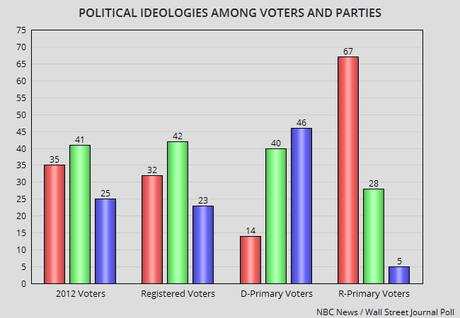
The Republican Party, controlled by extremist teabagger elements in most states, seems to think they represent the feelings of most Americans. They think most Americans are conservatives, and many of them said after the 2012 election that they lost because their candidate wasn't conservative enough. They were wrong.
In the 2012 election, only 35% of voters identified themselves as conservatives, while 41% said they were moderates and 25% said they were liberals. And the fact that most Americans are not conservative is even more true today. Currently only 32% of registered voters identify as conservative, while 42% say they are moderate and 23% say they are liberal. This makes it more likely that general election voters will choose the least extremist candidate -- whether that candidate is a Democrat or Republican.
Of course, this brings up the question -- Which party is most likely to nominate the most moderate candidate? We can get a clue from this recent NBC News / Wall Street Journal Poll -- taken between March 1st and 5th of a random national sample of voters, with a margin of error of 3.1 points.
Note that the primary voters in the Republican Party are much more to a political extreme than the primary voters of the Democratic Party. About 67% of GOP primary voters identify themselves as conservative (with 28% moderate and 5% liberal), while only 46% of Democratic primary voters identify as liberal (with 40% as moderate and 14% as conservative). This makes it highly likely that the Republicans will nominate someone on the far right, while a majority of Democrats would be likely to choose someone more moderate.
This gives the Democrats an edge to begin with. Hillary Clinton is the most likely candidate, and she is already viewed as fairly moderate by most Democrats and most American voters. But the Republican candidates have a problem. They are going to have to veer far to the right to get nominated, and then come back to the middle to have a chance in the general election -- a very difficult task in the internet age, when their primary positions can be replayed over and over again in the general election.

